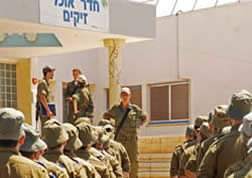 |
 |
|
|
The Palestinian Islamic Jihad and the Popular Resistance Committees claim responsibility for the attack (Al-Alam TV, September 11, 2007 ). |
The basic training camp at Zikim (Photo courtesy of the IDF Spokesman, September 11, 2007 ). |
Overview
1. Just before 2 a .m. on the morning of September 11 a rocket was launched from the region of Beit Lahiya in the northern Gaza Strip. It fell in the center of the basic training camp of Zikim, injuring 50 soldiers (four critically, seven moderately, and 39 slightly). 1
2. Responsibility for the attack was jointly claimed by the Palestinian Islamic Jihad and the Popular Resistance Committees , which also separately issued announcements claiming responsibility. According to the announcements, two rockets were fired (one by each group) at " Occupied Majdal [the Palestinian name for the Israeli city of Ashqelon ].” Only one rocket hit was identified, in the center of the basic training camp at Zikim. When claiming responsibility the organizations stressed that the "option of resistance” [i.e., continued terrorism and violence] was the best option and the only one capable of restoring Palestinian rights and liberating the holy places. They also warned Israel "not to do anything stupid,” otherwise the response would be worse.

A poster of PIJ operatives standing on an IDF tank and waving their rifles.
The flags bear the PIJ insignia. The caption (addressed to the IDF) reads "You have been beaten,
leave my land” (from the PIJ Website, September 11, 2007 ).
3. Abu Mujahed, a PRC spokesman, said that the rocket had hit an Israeli military base and that all the wounded were soldiers . He said it sent a clear message to "anyone who wants to enter the Gaza Strip.” He also said that the rocket had been timed for the Muslim holy month of Ramadan as "a good beginning for the month of victories” (BBC Radio, September 11). Hamas’ main Website, Palestine-info, said that " Israel is in shock” and called the event "an impressive action” in the Gaza Strip. Residents of the Gaza Strip were reported to have expressed joy at the number of wounded IDF soldiers.
 |
 |
|
|
Expressions of joy in Gaza City following the attack on the IDF soldiers at the Zikim base: passengers in passing cars get cookies and candy. (Ramatan News Agency, September 11, 2007). |
||
The terrorist organizations’ policy of firing rockets
4. Since the Hamas takeover of the Gaza Strip in the middle of June, an average of 15 rockets (between seven and 21) have fallen in Israeli territory every week. The PIJ launches most of them, while the rest are launched by smaller groups belonging to Fatah and the PRC operating under Hamas aegis .

5. Fearing escalation, Hamas, which controls the Gaza Strip, currently refrains from direct participation in the rocket fire into Israel . The organization’s terrorist operative wing contents itself with firing mortar shells at the crossings and area of the border security fence. However, Hamas allows and even encourages the terrorist organizations operating under its aegis to fire rockets, and senior Hamas activists and the media controlled by Hamas glorify the rocket fire (despite the fact that the Israeli and Palestinian media repeatedly express apprehension at a broad IDF military action in the Gaza Strip).

Terrorist operative carrying a rocket. The caption reads "Sderot under fire.”
Taken from a propaganda song broadcast by Hamas’ TV channel (Al-Aqsa TV, August 20, 2007 ).
6. For example, during the second half of August Mahmoud al-Zahar, a high-ranking Hamas leader and formerly the Hamas government’s foreign minister, was interviewed by a blog called Conflict Blotter. 2 The interview took place in the foreign ministry building of Ismail Haniya’s government in Gaza Strip. In it, Mahmoud al-Zahar explained the logic behind launching rockets into Israeli territory .
7. Mahmoud al-Zahar was asked why Hamas stopped carrying out suicide bombing attacks two years ago. He answered that it was a tactical decision based on the fact that rockets were more effective in undermining Israeli society . He explained why rockets against Sderot were preferable to suicide bombing attacks, saying:
"Rockets against Sderot will cause mass migration, greatly disrupt daily lives and government administration, and can make a much huger impact on the government. We are using the methods that convince the Israelis that their occupation is costing them too much. We are succeeding with the rockets …” (Conflict Blotter, August 21, 2007 ).
1 According to data provided by the IDF. The number does not include cases of shock.
2 Conflict Blotter is a blog written by Charles Levinson, a journalist based in Jerusalem since 2006.













